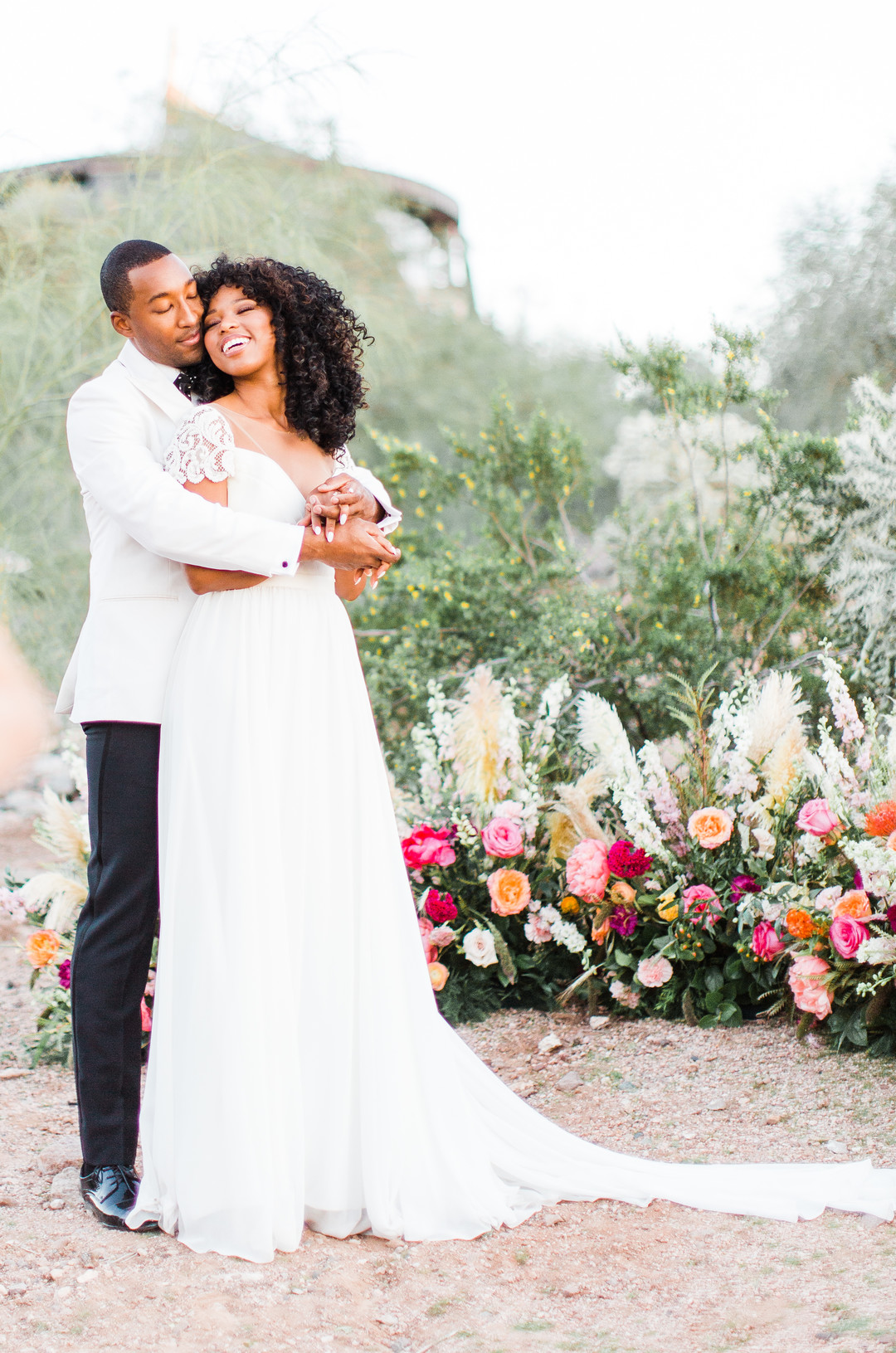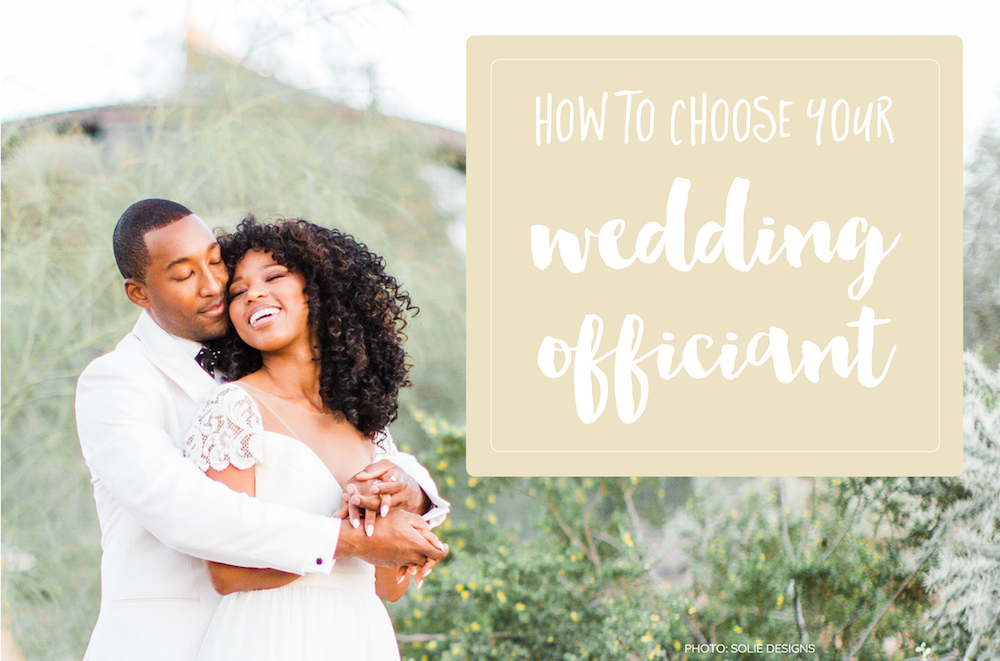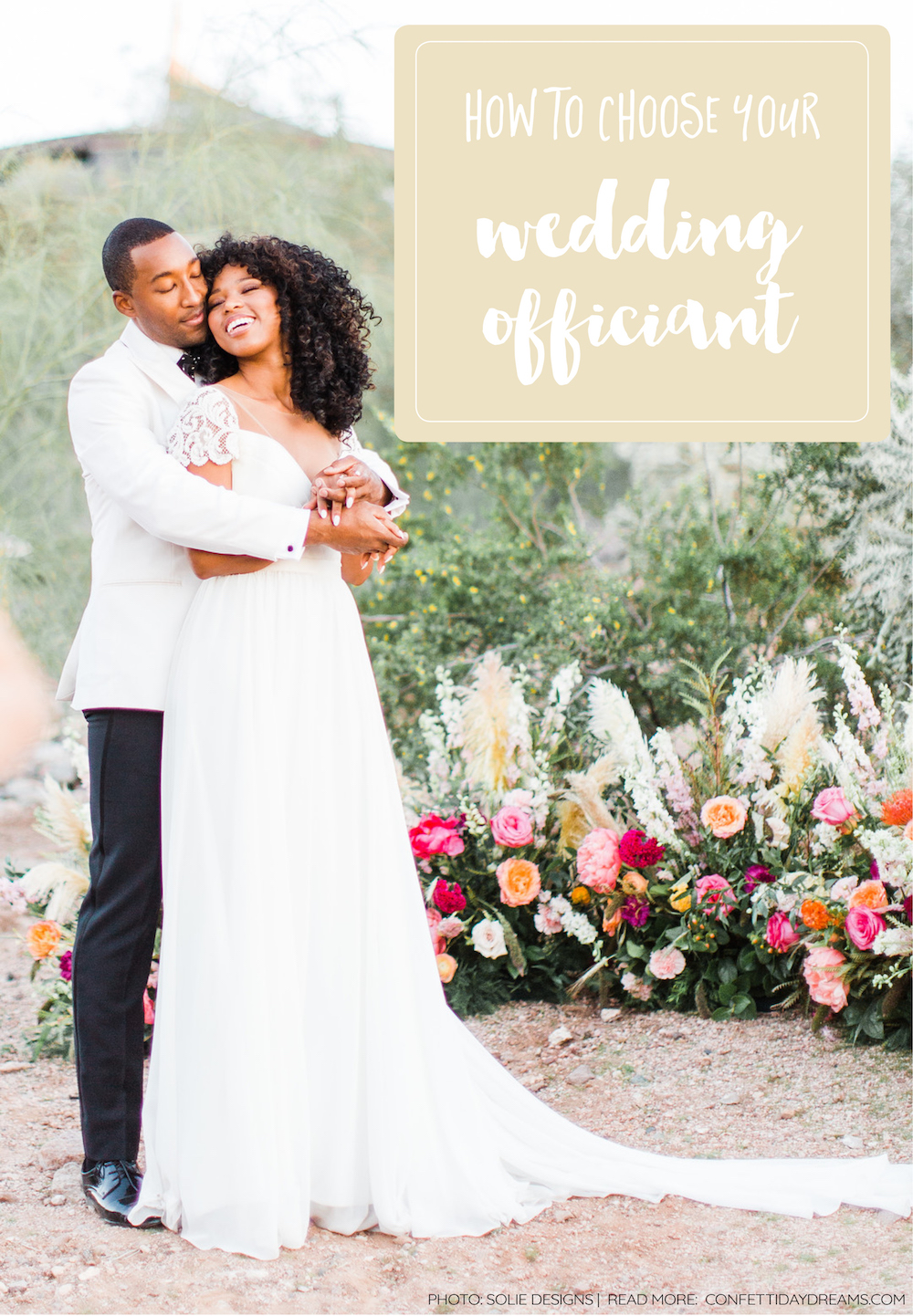How to choose your wedding officiant
Now that you’ve announced your engagement are in full wedding planning mode, it’s time to decide how to choose your wedding officiant. If you are already affiliated with a church or place of worship, chances are you’ll want to have your trusted religious leader lead your wedding ceremony. Or, perhaps you’d prefer a secular ceremony and will need to set out to find a great marriage officer to officiate your special day. Regardless of which couple you are, there are some important factors to consider when choosing the right wedding officiant.

How to choose your wedding officiant. (Photographer: Solie Designs. //Shoes:Bella Belle Shoes// Jewelry: Jennifer Behr// Dress Store: Blue Sky Bridal// Floral Designer:Rustic Bucket Floral// Tuxedo and Mens Attire: The Black Tux// Dress Designer: Truvelle // Dress Store:Bella Lily Bridal//)
Tips for Choosing a Wedding Officiant
In this week’s Wedding Planning Series installment, we’re featuring we’ve reached out to Nicci of Nicolette Weddings for advice on selecting the right marriage officer for your wedding:
1. Consider the Location of your Wedding Ceremony
When booking your marriage officer, it’s important to tell them exactly where you plan to get married. Some Catholic and Greek Orthodox priests, for example, will not perform ceremonies outside of their churches, while others will be happy to officiate your union in the great outdoors, provided your heads are covered by an arch or draped gazebo. Some marriage officers will be happy to marry you just about anywhere. It’s important to know the guidelines so that you can plan for it on your big day.
2. Decide on a Religious or Secular Ceremony
Discuss the depth of religion that will be brought into your ceremony with your marriage officer. Perhaps you want your faith to be front and center in your ceremony, perhaps you prefer a completely secular ceremony, or perhaps you’re somewhere in between. Chat to your potential officiant in detail about the exact level of religious involvement you’re both keen on, to make sure you’re all on the same page.
3. Choose a Male or Female Marriage Officer
Choose a male or female marriage officer, depending on who you feel more comfortable with.
4. Ensure your Marriage Officer is Certified
It may seem obvious, but should definitely not be taken for granted! “Take a moment to make sure that your chosen marriage officer is certified and qualified to perform your ceremony and legally register your marriage,” advises Nicolette. If you’re having a friend or loved one officiate for you, make sure that they have the legal power to officially do so, or consider having a legal ceremony beforehand.
There is a huge amount of trust that goes into allowing a person to bind you and your other half forever, and you need to be confident that your trust is well placed. It would also be a fantastic idea to make sure that your chosen marriage officer is both reliable and reputable.
5. Connect with your Marriage Officer
Choose someone you are comfortable enough with to share the most intimate moment of your life with. It is crucially important, to your day, and the months leading up to your wedding, that you like, feel comfortable with and get on with your wedding officiant, says Nicolette.
6. Calculate the Costs Involved
Marriage officers charge a fee or donation. Before booking him or her, find out what your marriage officer’s fee includes. Nicolette advises that you ensure that their fee includes at least one pre-wedding consultation, travel, performing the ceremony, as well as the legal registration of your marriage.
7. Meet Beforehand
Regardless of who you choose to officiate your union, Nicci advises that you make sure to meet with your marriage officer beforehand to plan the ceremony and discuss the proceeding of events. This is especially important to do before you have your order of service printed.
8. Understand the Order of Ceremony Events
Work with your chosen officiant to create your wedding ceremony timeline – aka order of service. If you’re going the religious route, your ceremony will likely have a predetermined format that your religious leader will be able to provide. If you’re going the secular route you’ll have more freedom to determine your own order and include readings, and ceremonies of your choosing – but you’ll still need to discuss these with your officiant. He or she will be able to guide you on timings, order and even offer up a few unique suggestions that you might not have considered.
Choosing the correct wedding officiant will help you get one step closer to creating a beautiful, meaning ceremony that is a true celebration of your love.
Next: How to select your wedding photographer.
MORE TO RESOURCES:
- How to Plan a Wedding in 100 Steps: Detailed Checklist {Start here}
- How to start your wedding budget breakdown {Wedding Planning Series Part 1}
- How select guests and plan your wedding guest list {Wedding Planning Series Part 2}
- How to Plan Your Engagement Party {Wedding Planning Series Part 3}
- What Does a Wedding Planner Do? Do I Need One? {Wedding Planning Series Part 4}
- 150 Question Wedding Venue Checklist {Wedding Planning Series Part 5}
- Selecting a Wedding Officiant {Wedding Planning Series Part 6}
- How to Choose A Wedding Photographer {Wedding Planning Series Part 7}
- When to order and send wedding stationery (timeline) {Wedding Planning Series Part 8}
- How to select your bridesmaids {Wedding Planning Series Part 9}

